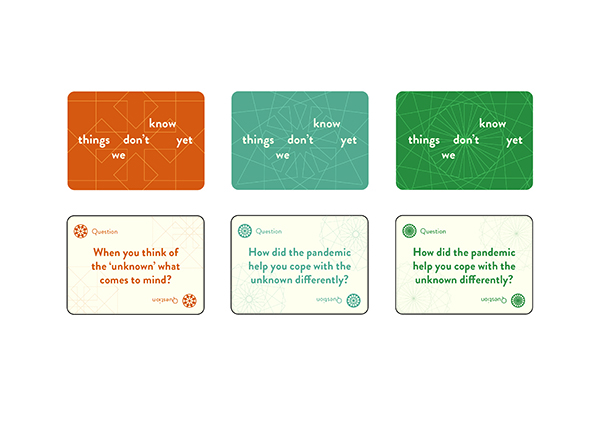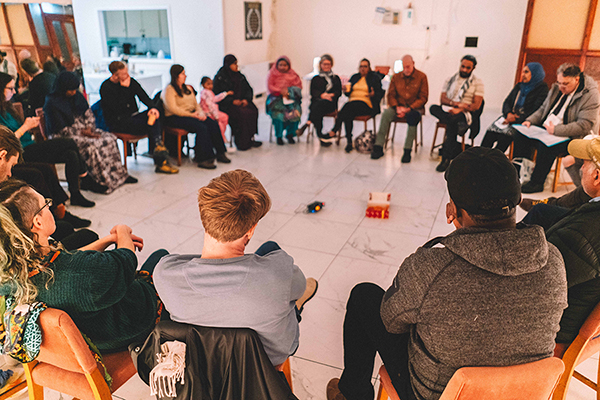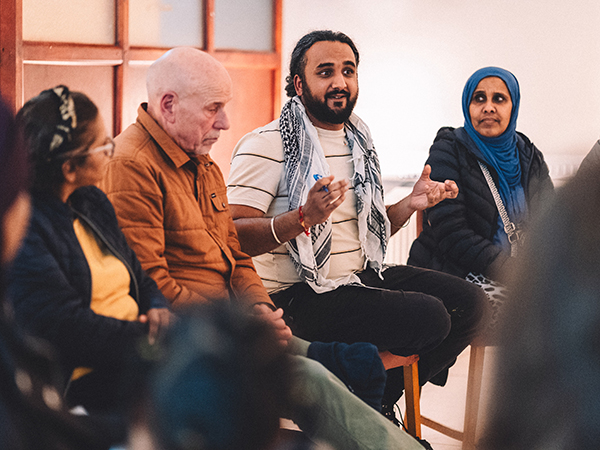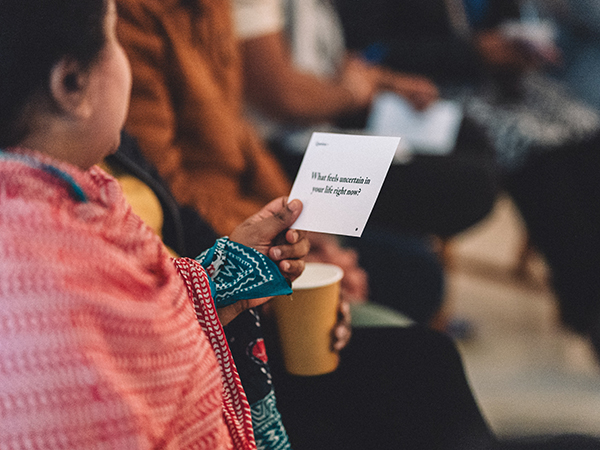--------------------------------------------
THINGS WE DON'T KNOW YET
conversation, card game
2024
--------------------------------------------
Things We Don't Know Yet was a commissioned project for gentle/radical in Cardiff, Wales.
Between Spring and Autumn 2023, I made visits to Riverside, in Cardiff, inviting one-on-one and group conversation with people living and working in the neighbourhood. Meeting in peoples’ homes, cafes, community centres, in parks, and walking through the streets, I spent time talking to Riverside residents about what they know, and, conversely, what they don’t know.
Between Autumn 2023 and February 2024, with the help of those residents who have gathered around the project and designer Oliver Norcott, I developed a pack of cards called 'Things We Don’t Know Yet'.
The aim of the cards is to help us gather more comfortably around questions of not knowing, to stay with the trouble of things we don’t know, in these times of encroaching darkness. The cards have their roots in Riverside and, as such, are focused on holding space for diverse groups of people around a set of broadly universal questions facing humanity, but can be used flexibly as meditation prompts, at home around the dinner table, in community spaces, office meeting rooms or in a clearing in the woods.
The cards were launched and given to contributors in February 2024.
gentle/radical are a Cardiff-based organisation rooted in the neighbourhood of Riverside, and interested in how the work of culture, creativity, spirituality, hospitality and solidarity can be in service to community building in our times.
MEDITATIONS ON NOT KNOWING (a text)
#1 When you think of ‘the unknown’, what comes to mind?
I’m on the train heading back home after my first visit to Riverside. I have a head full of things people have said to me, ideas slowly finding their form through conversation. It’s been a few years and I’ve forgotten how tough this process is; to arrive somewhere I’ve never been, to meet new people and expect them to put even a degree of trust in me, so that we might make something together. How can the conversations that I have with the people who live and work here become something that equally honours not only their time, energy, goodwill and vulnerability, but also this frame of slowness, my own capacity to spend time here, and the inevitable urgencies of producing some ‘good work’ within a given timeframe? When it crosses my mind, when I’m not here, it feels too much to hold space for, and yet here we are, diving in together.
#26 What do we not know that we don’t know?
I’m in Madhav’s, again. The first stage of this work is always conversation, cups of tea and, in this case, plates of samosas. After spending hours talking with various neighbours, it’s rare I would leave without having learnt something new, surprising, or revelatory. Whether it’s an unusual collection or hobby, something someone has spent their life doing that no-one knows about, a journey they went on, or an ancestor the family tell stories about - there’s almost always something extraordinary going on in peoples’ lives. A human being is a wellspring. The basic premise of my work here is that great depths of knowledge and experience are held within every community, regardless of wealth, resource or infrastructure. That person glancing sidelong at us in the street, or tapping a toe in front of us in a queue, or sitting on a bench head in hands - not only do we not know them but neither do we acknowledge them. The conditions of our own lives within this system mean that we can’t make space for theirs. We have normalised this to such an extent that we don’t even see it anymore. How can we remind ourselves that everyone else’s reservoir of experience runs as deep as our own? And then, how might we unearth and share such a rich commons? I order another masala chai and begin to imagine.
#8 Are things becoming more uncertain for you?
Summer is here and I’m sitting on a bench in Despenser Gardens. The sound of children in the playground drifts over on the warm breeze. A pencil tapping on the blank notebook page open on my lap, my mind turns over the nature of the proposal, intervention, provocation, or whatever it turns out to be, that I will make to the people who live here. How can this work hold equally the joy, brokenness, grief, vulnerability, introspection, tenderness, marginalisation and precarity of urban life in late modernity? Having just heard that ‘Slowness as a Bridge’ will be the last programme of work the organisation carries out before taking a break to consider next steps, I wonder if gentle/radical are also grappling with the seeming impossibility of bearing the load of this work that needs doing. I later hear this question framed: how can we do the slow work of healing justice at the breakneck speed of capitalism? These unanswerable questions keep piling up. My approach so far has been the question of how to share the deep knowledge held in communities, but it starts to feel like the wrong kind of world-building. As the world that we know feels increasingly like it’s unravelling, maybe we also need to find more ways to hold space for not knowing.
#29 How could not knowing bring us together?
What does it mean to hold space for not knowing? What might its value be? We are deep into November now and I’m pacing around feeling nervous as people begin to arrive at the Bangladesh community centre on Machen Place. We are gathered here around a prototype version of the cards. As the evening progresses, my anxiety peters out in the warmth of exchange, and I find myself able to listen more deeply. Listening to each other, as opposed to being in dialogue, is a skill that I’ve been putting time into these last few years. It involves having to step back from what you want to say in response to what you hear. It’s a practice and a challenge. We move away from the angularity of debate and into a softer way of being together. Silence is the vessel that binds us.
Sharing what we think we know forces us to defend our positions from the beliefs of others. Exploring what we don’t know allows us to lean in towards each other, feeling together for what might emerge. When I’m occupying this mindset, I find myself uttering surprising things. And In this space of listening, it doesn’t matter if sentences are left unfinished. If others do the same, what emerges feels more collective, because the silence in which it is held belongs to all of us. I place words into the silence. We turn them over together, without judgement. We don’t have the answers, but we are here together, exploring the questions.
#30 Without knowing what the future holds, what feels hopeful?
I’m at home in Sheffield as I write. I look out of the window from where I sit, at our garden being battered by yet another storm with a name. Just beyond our garden is a stretch of wasteland that we bought last year with ten other people living on our street. We don’t know what we want to do with it yet, but we’re putting time into clearing it, and taking bags of rubbish to the tip. The deeper we go, the more rubble and old mattresses we uncover. The work moves slowly and the destination is unclear. What is clear is that this is a shared project, and that in some way we are all invested in the work of healing this small patch of land and the animal, vegetable and mineral souls that might reside in it.
We live in a culture obsessed with solutions. We seek the quickest solution to a problem, even if it isn’t the best. The idea of accepting the problem as a condition of living is unthinkable to those who make decisions. Imagine the response in the House of Commons to such a suggestion. And yet, as conversations over the last nine months have laid bare, we know very little and, what’s more, many of us are quite comfortable with that. Capitalism needs problems in order to sell solutions. It is therefore a deeply radical position to accept that we don’t have the answers and to live in that acceptance. My hope for these cards is that, in some small way, they allow us to step together into this unknown, to walk hand in hand out beyond the edges of the map, with only each other to guide us.
SUGGESTIONS FOR CARD USE
There is no prescriptive way for how the cards could be used but here are a handful of suggestions:
INNER (personal)
Take a card, randomly or deliberately. It could be a card that intrigues you, or repels you, or that you don’t initially understand or feel moved by. Put it somewhere that means you will see it repeatedly during the course of your day or week. Sit with the question, get to know it. Notice what it moves in you, how your response to it changes. Maybe journal your responses. Change the card as regularly as you wish.
LISTENING (domestic/small group/friends)
Sit comfortably, facing each other. One person takes a card and reads it aloud. All participants respond to the card one by one. Each participant has 3 minutes to speak, which is timed. Other participants do not respond to what is said, only listen, until everyone has spoken. When everyone has taken a turn, take five or ten minutes to share thoughts before moving onto another question. The group may find it useful to start with orange questions, moving through blue and green during this or subsequent sessions.
DIALOGUE (community/larger group/strangers or associates)
Sit in a large circle. Before starting, turn to the person next to you, sharing with each other something that they wouldn’t know about you. The facilitator hands out a few orange question cards to some participants, who can either read the question they have been given aloud and make a response to it themselves, or pass it on without comment. The aim is to allow conversation to build around the questions and move on to another question when the conversation peters out. The facilitator may find it useful to start with orange questions, moving through blue and green during this or subsequent sessions. If a group feels too large it can simply split into smaller groups.
BLANK CARDS
The grey cards are deliberately blank, as it is anticipated that the process will throw up further questions, which can be written by hand and added to the pack.
The gentle/radical programme 'Slowness As A Bridge' was funded by the Arts Council of Wales, as part of their Connect and Flourish programme. The card pack was designed by Oliver Norcott, in collaboration with Ian Nesbitt. Ian and gentle/radical wish to acknowledge the Riverside residents who participated in the project, gave their time, shared ideas, and reflections. They are Adam, Ali, Anna, Arron, Ayan, Becca, Billy, Chris, Colleen, David, Deborah, Dunia, Eugene, Fatima, Gavin, Gerald, Hedydd, Katja, Kinsey, Lyndsey, Lisa, Maha, Marian, Nigel, Nilufa, Peter, Rif, Shanara, Stephen, Sue, Tony, Vilas, and Yamin.



